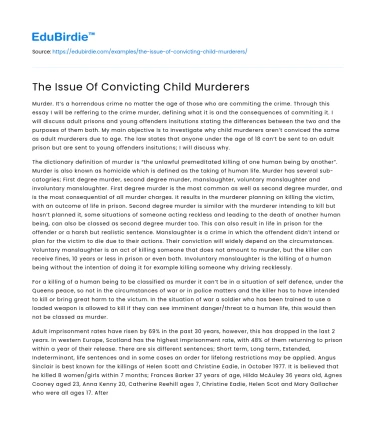Introduction
The conviction of juvenile offenders, specifically those accused of heinous crimes like murder, presents a multifaceted challenge within the criminal justice system. Society grapples with the paradox of viewing children as innocent and vulnerable while acknowledging their potential for committing grievous acts. The legal system is faced with the dilemma of balancing the need for justice with the rehabilitative needs of young offenders. The United Nations Convention on the Rights of the Child advocates for the treatment of child offenders that considers their age and potential for reform, yet public outcry for severe punishment often influences judicial proceedings. This essay examines the intricate issues surrounding the conviction of child murderers, exploring legal frameworks, psychological considerations, and societal impacts. By evaluating real-life cases and scholarly perspectives, this discourse seeks to unravel the ethical and practical implications of prosecuting juveniles in adult courts.
Legal Frameworks and Judicial Challenges
The legal systems across the globe vary significantly in their approach to juvenile justice, particularly in cases involving serious crimes. In the United States, the Supreme Court's decision in Roper v. Simmons (2005) exemplifies the evolving legal stance, where the death penalty for juveniles was deemed unconstitutional due to their cognitive and moral development stages. This landmark ruling highlighted the recognition of adolescents' reduced culpability compared to adults. However, the option to try juveniles as adults remains contentious, as evidenced by cases like that of Lionel Tate, who was convicted of first-degree murder at the tender age of 12. His initial life sentence without parole sparked a debate on the appropriateness of adult penalties for juvenile offenders.
Save your time!
We can take care of your essay
- Proper editing and formatting
- Free revision, title page, and bibliography
- Flexible prices and money-back guarantee
Conversely, countries like Norway follow a more rehabilitative model, prioritizing the reformation and reintegration of young offenders into society. The case of Anders Breivik, although involving an adult, showcases Norway's emphasis on humane sentencing, which indirectly influences its approach toward juvenile justice. The variation in legal practices underscores the complexity of establishing a universally applicable judicial response to child murderers. Furthermore, the implementation of international guidelines, such as those from the United Nations, remains inconsistent, often colliding with domestic laws and societal expectations.
Judicial challenges also arise from the inherent tension between public demand for retribution and the ethical obligation to consider the developmental immaturity of child offenders. Legal scholars argue for a nuanced approach that incorporates psychological assessments and individualized sentencing, yet the implementation of such measures faces logistical and financial constraints. The need for specialized juvenile courts and trained professionals emphasizes the importance of a system that is not merely punitive but also corrective and supportive.
Psychological and Societal Implications
The psychological development of children plays a crucial role in understanding their involvement in violent crimes. Studies indicate that juveniles possess an underdeveloped prefrontal cortex, which affects decision-making, impulse control, and risk assessment. This neurological immaturity is a critical factor in assessing culpability and sentencing. Dr. Laurence Steinberg, a prominent psychologist, posits that adolescents are "less capable than adults of weighing the long-term consequences of their actions," thus warranting a system that emphasizes rehabilitation over punishment.
Moreover, the societal implications of convicting child murderers extend beyond the courtroom. The stigmatization of young offenders can hinder their reintegration into society, perpetuating a cycle of crime and marginalization. The media portrayal of child criminals often exacerbates public fear and demands for harsh sentencing, overshadowing the potential for rehabilitation and change. Programs focusing on restorative justice and community-based interventions have shown promise in redirecting juveniles towards constructive paths, yet these initiatives require societal support and understanding.
Counter-arguments suggest that leniency towards juvenile offenders may undermine the deterrent effect of the criminal justice system. Critics argue that severe crimes necessitate equally severe consequences, regardless of the perpetrator's age. However, empirical evidence on the deterrent effect of harsh sentencing on juveniles remains inconclusive, highlighting the need for a balanced approach that considers both punishment and potential for reform.
Ethical Considerations and Future Directions
The ethical considerations surrounding the conviction of child murderers are deeply rooted in the principles of justice, fairness, and human rights. The debate centers on whether children should be held to the same standards of accountability as adults, given their developmental differences. Ethicists argue for a compassionate approach that recognizes the potential for growth and transformation, aligning with the philosophical underpinnings of juvenile justice.
Future directions in addressing this issue involve a multidisciplinary approach, integrating legal, psychological, and social perspectives. Policymakers are urged to develop frameworks that accommodate the unique needs of juvenile offenders while ensuring public safety. Collaborative efforts between governments, communities, and international bodies can pave the way for more consistent and humane treatment of child murderers across jurisdictions.
Technological advancements in neuroscience and behavioral studies offer new insights into adolescent development, promising to inform judicial practices and sentencing policies. The integration of scientific research into legal proceedings can enhance the accuracy and fairness of outcomes, providing a more comprehensive understanding of juvenile criminal behavior.
Conclusion
In conclusion, the issue of convicting child murderers encapsulates a complex interplay of legal, psychological, and societal factors. The discourse highlights the necessity for a justice system that is both equitable and rehabilitative, acknowledging the unique circumstances of juvenile offenders. Real-life cases and scholarly insights underscore the challenges and opportunities in reforming juvenile justice practices. By embracing a balanced approach that prioritizes rehabilitation alongside accountability, societies can foster environments conducive to the positive transformation of young offenders. The path forward requires a commitment to ethical considerations and evidence-based policies, ensuring that justice is served without compromising the potential for redemption and reintegration.






 Stuck on your essay?
Stuck on your essay?

